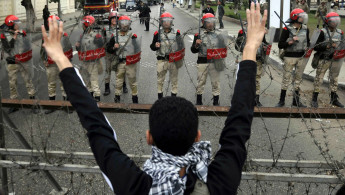Military muscles in on Egyptian justice
On a cold December night in Matria, east Cairo, five security officers raided the flat of 18-year-old Muhammad Ahmad al-Arabi, confiscated his laptops and then took him to a military security service station in Nasr City.
The student at Ain Shams university had been arrested for comments made on Facebook, and found himself standing in front of a military court facing a "misdemeanor charge 4108/2014."
Muhammad's father was told by a military public prosecutor, that his son would be "disciplined and then released". That was more than a month ago. His dad has yet to see his son, even though he has secured permits.
According to the No Military Trials for Civilians campaign, Muhammad is one of more than 1,300 Egyptian civilians referred to military courts since the introduction of the "military facilities protection law" on 8 October 2014.
The law was signed to prevent "terrorism" against the state and covers university campuses, meaning students such as Muhammad can be picked up for all manner of offences.
| Muhammad is among 1,300 Egyptian civilians referred to military courts since the introduction of the 'military facilities protection law' last October. |
No Military Trials for Civilians has long argued that military courts lack many of the basic guarantees for a fair trial. The courts report to the minister of defence, who appoints judges from the ranks of the military based on the recommendations of the military judiciary commission.
On 30 October 2014, 15 Egyptian civil society groups issued a unified statement criticising the expanded jurisdictions given to the military judiciary.
It said that the military facilities protection law made a huge number of public facilities the equivalent of military facilities. This, they said, gave the military courts expanded powers in a way that endangers the right to a fair trial, and exacerbates the current crisis in Egypt’s justice system.
Human Rights Watch also criticised the new law, calling it an "unprecedented expansion of the military courts' powers".
The No Military Trials for Civilians was founded by the political activist Mona Sayf al-Islam, who is nicknamed the "Butterfly of the Revolution".
She is the daughter of the late human rights defender Ahmad Sayf al-Islam and political activist Layla Suwayf, and the sister of political activist Alaa Abd al-Fattah, who has been jailed by the regime.
This is an edited translation of the original Arabic.



